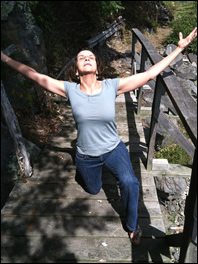 “You have to say ‘no’ to what you don’t want in order to be able to say ‘yes’ to what you do want.” My yoga teacher, Fran Ubertini, told me this almost every time we met in our private sessions. It took me a long time to grasp what she really meant and apply it in my life.
“You have to say ‘no’ to what you don’t want in order to be able to say ‘yes’ to what you do want.” My yoga teacher, Fran Ubertini, told me this almost every time we met in our private sessions. It took me a long time to grasp what she really meant and apply it in my life.
One area of my life I did not want to accept was age and its effects. I didn’t want to accept a decline in my energy from what it had been ten years earlier. And, I didn’t want to acknowledge a connection between the time I was putting into my yoga studies, teaching six to eight classes a week at the Community College and Movement Center, other varied activities, maintaining a home life and the fatigue I was feeling.
At the same time, I wanted to do some things for which I hadn’t the time or energy – writing a blog, offering workshops and study groups, participating more in the community, gardening and cooking. Likewise, there were things I had tired of in my job – having to grade my students in yoga, teaching 8 am classes, and being tied to a semester calendar.
One thing I have learned is the importance of viveka, or discernment. Yoga teaches that if we do not have the ability to discern wisely, we are destined to make choices and act based upon unconscious behavioral patterns. Critical to viveka, then, is awareness of who we are, how we tend to react, and what we want and don’t want. If we are saying “yes” to too many things, how do we know we are correct in our choice of what to give up? Discernment requires a process of verification.
In my case, I recognized what I wanted to do and what I had tired of doing. Even so I found giving up teaching at the college to be very difficult. At first I would tell myself I couldn’t leave because I needed the money earned there. I had to think about what it would be like without that income, as well as talk with my husband about the implications for us as a family. When money was cleared as an obstacle, I had to face my attachment to the job, to a certain credibility it gave me and to the fear of change leaving raised.
I could never have made my choice to leave college teaching if I had not been able to discern that ego and fear were keeping me attached to a path no longer serving me and limiting my ability to move in the direction I wanted. It was viveka, and the process of reflection and verification that allowed me to feel confident of my choice to say “no.”
The eight-limbs of yoga give us tools to develop viveka. The Yoga Sutra identifies the eight limbs in II.29: ethical principles, guidelines for self-care, postures, breathing practices, discipline of the senses, and the inner limbs of concentration, meditation, and complete absorption. With a regular practice of these tools of yoga over time, we can come to know ourselves better and to create a space from which we can discern and verify a positive direction for ourselves.
I had to say “no” to teaching yoga at the college in order to be able to say “yes” to feeling rested, to having time to write a blog, start a yoga study group, start a training in chanting, spend more time with my newly retired husband, and to making more time to cook and bake. I am a believer in my teacher’s mantra of “saying ‘no’ to what you don’t want to be able to say ‘yes’ to what you do want” – and a huge believer in the ability of yoga practice to help us get there.
~